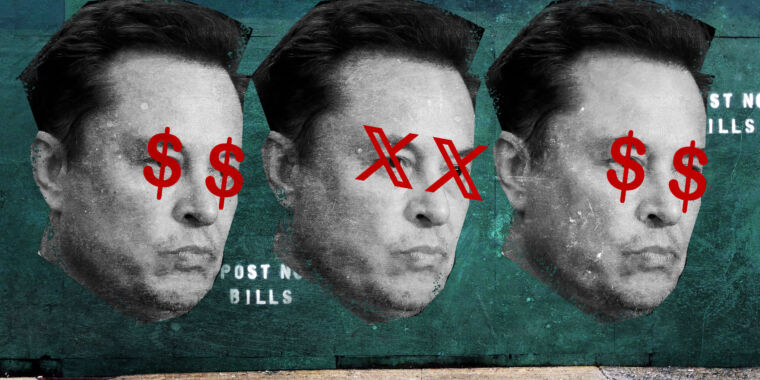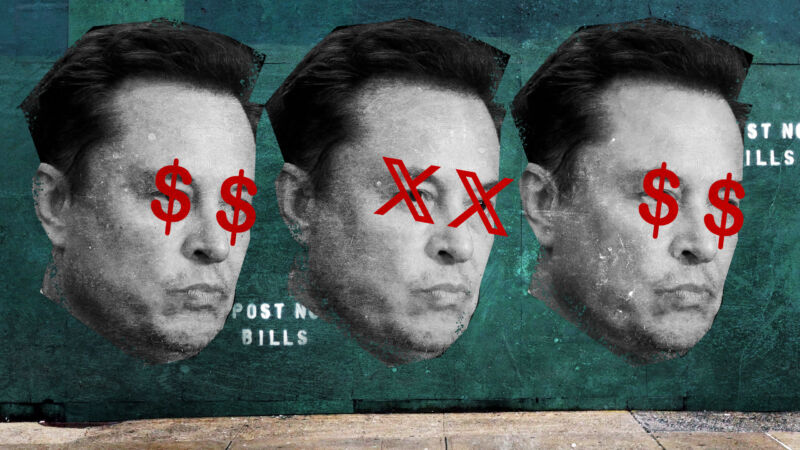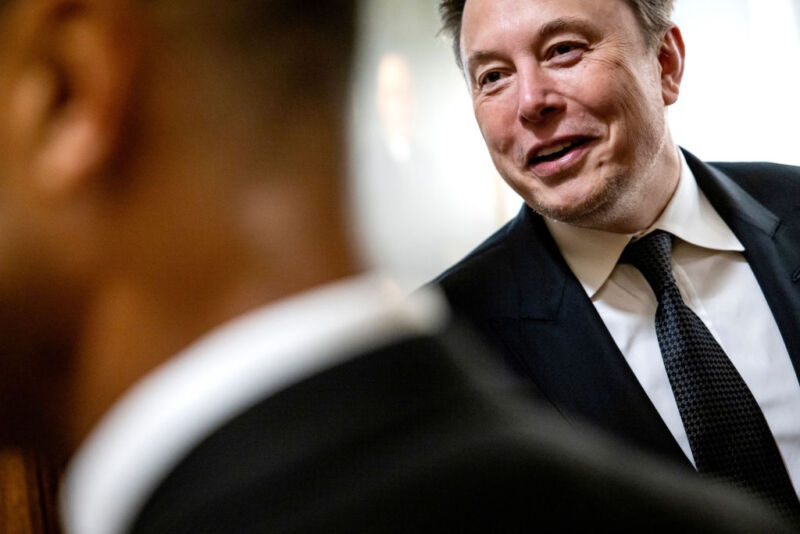Is it illegal to not buy ads on X? Experts explain the FTC’s bizarre ad fight.
Here’s the “least silly way” to wrap your head around the FTC’s war over X ads.
Credit: Aurich Lawson | Getty Images
After a judge warned that the Federal Trade Commission’s probe into Media Matters for America (MMFA) should alarm “all Americans”—viewing it as a likely government retaliation intended to silence critical reporting from a political foe—the FTC this week appealed a preliminary injunction blocking the investigation.
The Republican-led FTC’s determined to keep pressure on the nonprofit—which is dedicated to monitoring conservative misinformation—ever since Elon Musk villainized MMFA in 2023 for reporting that ads were appearing next to pro-Nazi posts on X. Musk claims that reporting caused so many brands to halt advertising that X’s revenue dropped by $1.5 billion, but advertisers have suggested there technically was no boycott. They’ve said that many factors influenced each of their independent decisions to leave X—including their concerns about Musk’s own antisemitic post, which drew rebuke from the White House in 2023.
For MMFA, advertisers, agencies, and critics, a big question remains: Can the FTC actually penalize advertisers for invoking their own rights to free expression and association by refusing to deal with a private company just because they happened to agree on a collective set of brand standards to avoid monetizing hate speech or offensive content online?
You’re not alone if you’re confused by the suggestion, since advertisers have basically always cautiously avoided associations that could harm their brands. After Elon Musk sued MMFA—then quickly expanded the fight by also suing advertisers and agencies—a running social media joke mocked X as suing to force people to buy its products and the billionaire for seeming to believe it should be illegal to deprive him of money.
On a more serious note, former FTC commissioner Alvaro Bedoya, who joined fellow Democrats who sued Trump for ejecting them from office, flagged the probe as appearing “bizarrely” politically motivated to protect Musk, an ally who donated $288 million to Trump’s campaign.
The FTC did not respond to Ars’ request to comment on its investigation. But seemingly backing Musk’s complaints without much evidence, the FTC continues to amplify his conspiracy theory that sharing brand safety standards harms competition in the ad industry. So far, the FTC has alleged that sharing such standards allows advertisers, ad buyers, and nonprofit advocacy groups to coordinate attacks on revenue streams in supposed bids to control ad markets and censor conservative platforms.
Legal experts told Ars that these claims seem borderline absurd. Antitrust claims usually arise out of concerns that collaborators are profiting by reducing competition, but it’s unclear how advertisers financially gain from withholding ads. Somewhat glaringly in the case of X, it seems likely that at least some advertisers actually increased costs by switching from buying cheaper ads on the increasingly toxic X to costlier platforms deemed safer or more in line with brands’ values.
X did not respond to Ars’ request to comment.
The bizarre logic of the FTC’s ad investigation
In a blog post, Walter Olson, a senior fellow at the Cato Institute’s Robert A. Levy Center for Constitutional Studies, picked apart the conspiracy theory, trying to iron out the seemingly obvious constitutional conflicts with the FTC’s logic.
He explained that “X and Musk, together with allies in high government posts, have taken the position that for companies or ad agencies to decline to advertise with X on ideological grounds,” that “may legally violate its rights, especially if they coordinate with other entities in doing so.”
“Perhaps the least silly way of couching that idea is to say that advertisers are combining in restraint of trade to force [X] to improve the quality of its product as an ad environment, which you might analogize to forcing it to offer better terms to advertisers,” Olson said.
Pointing to a legal analysis weighing reasons why the FTC’s antitrust claims might not hold up in court, Olson suggested that the FTC is unlikely to overcome constitutional protections and win its ad war on the merits.
For one, he noted that it’s unusual to mingle “elements of anticompetitive conduct with First Amendment expression,” For another, “courts have been extremely protective of the right to boycott for ideological reasons, even when some effects were anti-competitive.” As Olson emphasized to Ars, courts are cautious that infringing First Amendment rights for even a brief period of time can irreparably harm speakers, including causing a chilling effect on speech broadly.
It seems particularly problematic that the FTC is attempting to block so-called boycotts from advertisers and agencies that “are specifically deciding how to spend money on speech itself,” Olson wrote. He noted that “the decision to advertise, the rejection of a platform for ideological reasons, and communication with others on how to turn these speech decisions into a maximum statement are all forms of expression on matters of public concern.”
Olson agrees with critics who suspect that the FTC doesn’t care about winning legal battles in this war. Instead, experts from Public Knowledge, a consumer advocacy group partly funded by big tech companies, told Ars that, seemingly for the FTC, “capitulation is the point.”
Why Media Matters’ fight may matter most
Public Knowledge Policy Director Lisa Macpherson told Ars that “the investigation into Media Matters is part of a larger pattern” employed by the FTC, which uses “the technical concepts of antitrust to further other goals, which are related to information control on behalf of the Trump administration.”
As one example, she joined Public Knowledge’s policy counsel focused on competition, Elise Phillips, in criticizing the FTC for introducing “unusual terms” into a merger that would create the world’s biggest advertising agency. To push the merger through, ad agencies were asked to sign a consent agreement that would block them from “boycotting platforms because of their political content by refusing to place their clients’ advertisements on them.”
Like social media users poking fun at Musk and X, it struck Public Knowledge as odd that the FTC “appears to be demanding that these ad agencies—and by extension, their clients—support media channels that may spread disinformation, hate speech, and extreme content as a condition for a merger.”
“The specific scope of the consent order seems to indicate that it does not reflect focus on the true impacts of diminished ad buying competition on advertisers, consumers, or labor, but instead the political impact of decreased revenue flows to publishers hosting content favorable to the Trump administration,” Public Knowledge experts suggested.
The demand falls in line with other Trump administration efforts to control information, Public Knowledge said, such as the FCC requiring a bias monitor for CBS to approve the Paramount-Skydance merger. It’s “all in service of controlling the flow of information about the administration and its policies,” Public Knowledge suggested. And the Trump administration depending on “the lack of a legal challenge due to industry financial interests” is creating “the biggest risk to First Amendment protections right now,” Phillips said.
Olson agreed with Public Knowledge experts that the agencies likely could have fought to remove the terms as unconstitutional and won, but instead, the CEO of the acquiring agency, Omnicom, appeared to indicate that the company was willing to accept the terms to push the merger through.
It seems possible that Omnicom didn’t challenge the terms because they represent what Public Knowledge suggested in a subsequent blog was the FTC’s fundamental misunderstanding of how ad placements work online. Due to the opaque nature of ad tech like Google’s, advertisers started depending on ad agencies to set brand safety standards to help protect their ad placements (the ad tech was ruled anti-competitive, and the Department of Justice is currently figuring out how to remedy market harms). But even as they adapted to an opaque ad environment, advertisers, not their agencies, have always maintained control over where ads are placed.
Even if Omnicom felt that the FTC terms simply maintained the status quo—as the FTC suggested it would—Public Knowledge noted that Omnicom missed an opportunity to challenge how the terms impacted “the agency’s rights of association and perfectly legal, independent refusals to deal by private companies.” The seeming capitulation could “cause a chilling effect” not just impacting placements from Omnicom’s advertiser clients but also those at other ad agencies, Public Knowledge’s experts suggested.
That sticks advertisers in a challenging spot where the FTC seemingly hopes to keep them squirming, experts suggested. Without agencies to help advise on whether certain ad placements may risk harming their brands, advertisers who don’t want their “stuff to be shown against Nazis” are “going to have to figure out how” to tackle brand safety on their own, Public Knowledge’s blog said. And as long as the ad industry is largely willing to bend to the FTC’s pressure campaign, it’s less likely that legal challenges will be raised to block what appears to be the quiet erosion of First Amendment protections, experts fear.
That may be why the Media Matters fight, which seems like just another front with a tangential player in the FTC’s bigger battle, may end up mattering the most. Whereas others directly involved in the ad industry may be tempted to make a deal like Omnicon’s to settle litigation, MMFA refuses to capitulate to Musk or the FTC, vowing to fight both battles to the bitter end.
“It has been a recurring strategy of the Trump administration to pile up the pressure on targets so that they cannot afford to hold out for vindication at trial, even if their chances there seem good,” Olson told Ars. “So they settle.”
It’s harder than usual in today’s political climate to predict the outcome of the FTC’s appeal, Olson told Ars. Macpherson told Ars she’s holding out hope “that the DC court would take the same position that the current judge did,” which is that “this is likely vindictive behavior on the part of the FTC and that, importantly, advertisers’ First Amendment rights should make the FTC’s sweeping investigation invalid.”
Perhaps the FTC’s biggest hurdle, apart from the First Amendment, may be a savvy judges who see through their seeming pressure campaign. In a notable 1995 case, a US judge, Richard Posner, “took the view that a realistic court should be ready to recognize instances where litigation can be employed to generate intense pressure on targets to settle regardless of the merits,” Olson said.
While that case involved targets of litigation, the appeals court judge—or even the Supreme Court if MMFA’s case gets that far—could rule that “targets of investigation could be under similar pressure,” Olson suggested.
In a statement to Ars, MMFA President Angelo Carusone confirmed that MMFA’s resolve has not faded in the face of the FTC’s appeal and was instead only strengthened by the US district judge being “crystal clear” that “FTC’s wide-ranging fishing expedition was a ‘retaliatory act’ that ‘should alarm all Americans.'”
“We will continue to fight this blatant attack on our First Amendment rights because if this Administration succeeds, so can any Administration target anyone who disagrees,” Carusone said. “The law here is clear, and we are optimistic that the Circuit Court will see through this appeal for what it is: an attempt to do an end run around constitutional law in an effort to silence political critics.”
Is it illegal to not buy ads on X? Experts explain the FTC’s bizarre ad fight. Read More »






